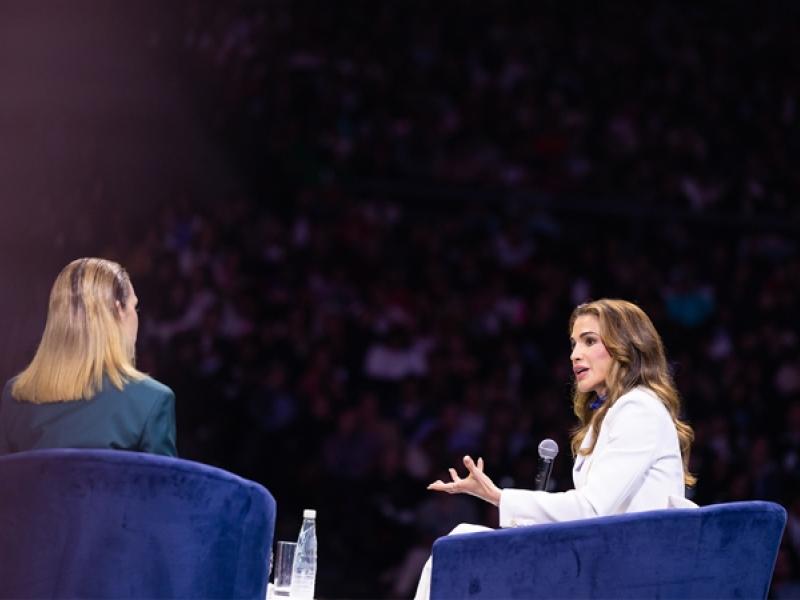CHRISTIANE AMANPOUR, CNN ANCHOR: Thank you and welcome to this special edition of CNN CONNECTS. Here in New York at the time of the U.N. General Assembly Summit, the annual summit and also when President Clinton launches his global initiative to tackle the issues that you saw in that report.
How will we rescue our planet from the kind of crippling poverty that causes nearly a billion people a year to try to struggle to stay alive on less than a dollar a day?
How will we rescue our planet from the climate change that is causing potentially more intense weather storms such as Hurricane Katrina?
How will we save our planet from Islamic extremists and any other religious extremists who want to deny people their rights, based on what they think is right for the world.
And what will we do about good government? How will we hold leaders accountable to their people, even leaders who've been elected? We have an incredibly distinguished panel here to discuss these issues. Of course, President Clinton, whose global initiative this is, and it is being launched today.
We have Bono, the U2 lead singer, rock star, who has made consigning poverty to the dustbin of history, his mission.
We have Queen Rania of Jordan, who is incredibly interested and active in the issue of micro finance, poverty, the equality for women and also about trying to keep the Middle East as part of an active member of the world community.
Paul Wolfowitz used to be deputy defense secretary and now is the head of the World Bank.
Jeffrey Saks, the director of the U.N. Millennium Project, who is involved in trying to eradicate extreme poverty.
And of course, Wangari Maathai, Nobel Peace Prize winner for her work on the environment, and who believes that poverty is inextricably linked with what is happening to our environment.
AMANPOUR: Well, let me ask you, Jeffrey Sachs, you've been actually implementing these Millennium Challenge goals around Africa and other places what have you found? I mean, is it enough to try to help the poorest of the poor by holding their leaders accountable? Of course, many people believe that individuals are responsible for their own economic woes, and if they would just pull up their bootstraps and work a little harder, maybe they could get somewhere. But is that always the case?
JEFFREY SACHS, U.N. MILLENNIUM CHALLENGE PROJECT DIRECTOR: Well, the problem is these people don't have boots, they don't have bootstraps. They can't tighten their belts; they have no belts. They need help. They're trapped in extreme poverty, where they don't have even enough to have enough food to eat in a day, safe drinking water, access to essential health services. So to give a lecture to them isn't going to do anything. And unfortunately we've been beating back, over many, many years now, this idea that it's enough just to tell people something, without helping them.
It's been 20 years of a fight for debt cancellation, because on top of everything else, we've been trying to force these countries to pay back their debts. That's been a long, long struggle. There are practical steps we've known about them for years, how to grow more food, how to fight malaria, AIDS, T.B., how to keep children in school with school meal programs, how to get safe drinking water, how to irrigate arid climates with treadle pumps and small scale irrigation.
These are practical means, measurable, monitorable. You can fight the corruption because you can measure these simple technologies, getting to the people that need them.
BONO: Trade, it's the most remarkable thing. You talk about the fishing rod and the fish; well here we are denying people the fishing rod. And the U.S. and Europe both have protectionist strategies, and so that the poorest of the poor cannot sell to us.
And so in Sunday service people are passing the plate for the poor black babies. Meanwhile, they're not allowed to sell their products and put them on our supermarket shelves, where we flood theirs with our cheap exports.
AMANPOUR: I must say, I was in Ethiopia around the G8, just before and the prime minister there said, look, debt relief is fantastic, aid is fantastic but what's really going to get us out of this hole is trade. So we'll follow up with that.
Queen Rania of Jordan, Jeffrey was talking about, you know, solutions. We can do it. We know what it takes to lift people out of poverty. What are some of the things that are happening in Jordan, amongst for instance the women and the other, you know, individual citizens that you work with?
QUEEN RANIA OF JORDAN: In Jordan, for example, micro credit has been an incredible tool that we've implemented to try to lift people out of poverty. And what's great about this is that people become, they are able to take control of their lives. It's the whole fishing rod thing. People are able to lift themselves out of poverty, to provide for their children, to provide education. And we've seen it being a very important empowering tool for women as well.
We've had repayment rates of about 98 percent, and we've seen women become more active in their societies, have more of a say in their households, even some of them are venturing into politics. So it's been an incredible success for us and a really effective tool.
AMANPOUR: And we've also talked -- President Clinton, Queen Rania has talked about individual efforts to step in where governments have failed. And we have, in our audience, in our side panel, here, people such as Muhammad Yunus, who started the whole issue of micro finance; Ted Turner, who was one of the first big civilian philanthropists; and of course Bill Gates, who is not here, but who is now just about a one-man vaccination agency that's really working.
I wanted to ask Muhammad Yunus, hi sir, nice to see you, I wanted to ask, you know, you pioneered this micro finance decades ago and nothing has really sort of come since. What is it that you see that should come since or has it?
MUHAMMAD YUNUS: Oh, a lot of changes have taken place. Lots of development has taken place in the micro finance area, like (INAUDIBLE) bank we lend over $5 million, 96 percent women, lend out over half a billion dollar a year on loans averaging $120.
You talk about corruption when you say corruption almost you give the impression the whole country is corrupt. It is not. Some people in that country might be corrupt. Some officials in that country may be corrupt. People are very honest.
And look at Gramin Bank in Bangladesh, all these half a billion dollar lending that we do there is no legal papers. There is no collateral. It gets paid back 99 percent of the payment. It's based on trust and it works beautifully, not only in Gramin Bank, anybody who has imitated Gramin Bank practices within Bangladesh, outside Bangladesh it works very well.
So, honesty of the people should be highlighted. The fact that society still exists, we have floods, disasters, nobody steals each other's property or each other's things, it works out very well.
So, you have to focus on the things that work and where is the money coming from in Gramin Bank, that half a billion dollars? It comes from the deposits of the borrowers and on borrowers. So, it's not somebody giving the money to them to lend money. So, it's always not the money is the issue. The issue is how do you structure your things.
AMANPOUR: What will it taken then to make what Mr. Yunus says work?
CLINTON: The United States, when I was president, funded about two million micro credit loans a year. I don't know what it is now but we should do more of it. You have to -- in order to have the impact that Muhammad Yunus has had in Bangladesh, if you want to list the per capital income of a country you have to figure out how many you have to do.
The second thing we have to do, I think, is to create the conditions within which banking can occur and lending can occur in every country by having some fairly substantial reforms of the property law.
For example, one of the things that Mr. Wolfowitz and the World Bank are doing and we're doing on the tsunami relief they gave $30 million for us to do a land titling project in Ache in Indonesia because we had land records that had to be restored in the capital.
But out in these little rural villages nobody had any property and, if they don't have a land certificate and title, they couldn't go to the bank and get any credit. So, we can in effect create literally a million mini Gramin Banks if people have any basis on which to start one.
QUEEN RANIA: The challenge now is how much -- how can we give civil society internationally more of a role to play where the government just monitors and regulates but they actually do the work?
And, they have to be held to high standards as well. They have to -- they have to stick to issues of transparency, of self regulation, of fighting corruption as well. But I think more and more as a global world we have to think of how we can give these organizations more of a role to play, a more substantial role.
AMANPOUR: We'll come back with Queen Rania and with you, Wangari Maathai, right after a break where we're going to talk about climate chaos, climate change, whatever you like to call it. How important is it?
And we're also going to talk about religious extremism and how we can combat that right after a break.
AMANPOUR: Can we move on to an extremely troubling development that's been really plaguing our world for the last several years and that is the notion of religious extremism? Sadly, it is right now Islamic extremism that is causing so much difficulty around the world.
So, I want to talk first to Queen Rania about this. What is the solution to this? Where are the moderates? Where are the people who, you know need to stand up within their own countries and in their own environments and basically denounce those who are committed to killing others who don't agree with them?
QUEEN RANIA: Well, first of all, we have to bridge what I like to refer to as the hope gap and that's the difference between people who have a chance of improving their lives and those who have absolutely no chance and we have to work at this at many levels.
First of all, children, children are born without any old scores to settle, without any prejudice or preconceived notions and so it's very important for us to really focus on the kind of education that they receive, to expand their horizons so that they're no longer vulnerable to people who want to preach hatred and anger towards them.
Mothers are very important because mothers influence their children, so a well-educated mother can make sure that she shields her children from those kinds of ideas.
At the second level, I think leaders have a very important role to play, whether it's leaders of countries, government, religious leaders, leaders in civil society. They all have to speak out and be proactive and say that this is wrong.
In Jordan we've done that. A year ago my husband had issued what has become known as the Amman message and that was a message in which he directly wanted to remind people of the basic values and tenants of Islam, a religion of moderation, equality, respect for human life.
We held a conference in July where we brought the leaders from all eight Muslim schools of thought and they unanimously condemned religiously motivated violence.
AMANPOUR: You mentioned education. Let me ask you, Mr. Wolfowitz, in terms of helping countries with the whole issue of education I wish President Musharraf was here. He's not at this panel but he has promised many times to close down the Madrassas in Pakistan, which basically many of them are breeding, you know, tons of little terrorists.
Even if he wanted to close them down where is the money for alternative education for those people who want to put their kids in some kind of education? Do we in the west bear some responsibility to really addressing that issue? Can the World Bank make any difference there?
WOLFOWITZ: I think we can. I think we are actually and I think it's true. The implication of your question is closing down Madrassas is not nearly as important as opening schools that will draw kids away.
And, in the state of Punjab in Pakistan, where I just visited, the government there, the state government, did an incredible job of increasing their own education budget by 20 percent and President Clinton knows how hard it is -- I mean you've got to take it from other parts of your budget.
It was impressive and then the World Bank topped that up by about another 15 percent on top and the result has been a huge increase in girls' enrollment, huge reduction in dropout rates, really measurable. And, Jeffrey's right, you need to measure measurable results in education.
QUEEN RANIA: And education is only the half of it. Once we give our children the tools to succeed we have to also give them the hope to find a good job and to improve their lives.
For example, in our region, the Middle East and North Africa region, we have to create about 100 million jobs in the next ten years and this can be viewed as either a demographic challenge or an opportunity.
If they have the right skills and they have the ability to find good jobs, then you can unleash great potential and harness that energy and productivity to really improve our -- our part of the world.
© Copyright, CNN


